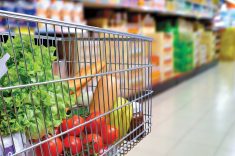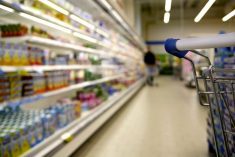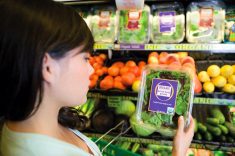Workers in agriculture and supporting industries are on a new federal guidance list of employees considered “essential to maintain the health, safety, security and economic well-being of Canadians” amid the COVID-19 pandemic.
Federal Public Safety Minister Bill Blair on Thursday released a new guidance document, “Guidance on Essential Services and Functions in Canada During the COVID-19 Pandemic,” which maps out the work required across Canada’s 10 “critical infrastructure sectors.”
“Food” is a stand-alone sector among those 10, which also include health; water; transportation; safety; energy and utilities; information and communication technologies; finance; government; and manufacturing.
Read Also

GMO food labelling review opens questions on gene editing
Canada is wrestling with how gene-editing should translate to voluntary genetically modified food labels, or whether it even should
The idea is to help “critical infrastructure employers” in the public and private sectors in “identifying and managing their workforce, while fostering alignment and harmonization across sectors.”
The government emphasized its guidance is “non-binding and advisory in nature, and should not be considered to be a federal directive or standard.”
“Through this incredibly challenging time, Canadians want the services they rely on every day for their health and safety and economic well-being to continue,” Blair said in a release. “We have put together this guidance to help support critical infrastructure employers in identifying and managing their workforce while responding to COVID-19.”
Apart from those in the retail grocery and take-out and delivery foodservice businesses, as well as those working at companies’ in-house employee cafeterias, the “Food” list of “essential services and functions” includes:
- agriculture and aquaculture workers and support service workers, including handlers of field crops and agricultural inputs and staff of storage facilities;
- animal agriculture workers, including those in the raising of animals for food; animal production operations; veterinary health; manufacturing and distribution of animal medical materials, animal vaccines, animal drugs, feed ingredients, feed, and bedding; transportation of live animals and animal medical materials; transportation of deadstock; and slaughter and packing plants along with their “associated regulatory and government workforce” including inspectors;
- workers in animal food, feed, byproduct and ingredient production, processing, packaging, and distribution; manufacturing, packaging and distribution of veterinary drugs; truck delivery and transport; and farm and fishery labour needed “to harvest and produce our food supply domestically;”
- workers undertaking “traditional” harvesting activities, including fishing, hunting and agricultural activities;
- employees of companies in the production of “chemicals, medicines, vaccines, and other substances used by the food and agriculture industry, including pesticides, herbicides, fertilizers, minerals, enrichments, and other agricultural production aids;”
- employees in the manufacture and maintenance of equipment and other infrastructure necessary to agricultural, aquaculture, and fishery production and distribution;
- employees and firms supporting food, feed, and beverage distribution, including warehouse workers and “vendor-managed inventory controllers;”
- workers supporting the “sanitation of all food manufacturing processes and operations from wholesale to retail;” and
- workers in food testing labs.
The “Other” list of essential service employees also includes veterinarians, veterinary technicians and their support staff as well as those involved in the health and welfare of animals, including boarding kennels, stables, animal shelters, zoos, aquariums, research facilities and other such providers.
The federal public safety department said Thursday it will “continually consult on and amend the list as events unfold” and noted the current list is “meant to be broadly representative.”
In a related statement Thursday, Agriculture Minister Marie-Claude Bibeau said she would “assure you that our government is taking all the necessary measures to ensure that Canadians always have access to quality food at affordable prices.
“We know how essential the women and men who work on farms, in processing plants and throughout the food supply chain are to our collective well-being. When we go to the grocery store, we can be confident there will be food on the shelves.”
In spite of their own concerns over safety in the current pandemic, she said, “food workers are on the job, working hard to make sure we all have enough to eat” and “businesses and public health departments are working to protect the health of food workers.”
Some industry groups had recently pressed for agriculture and related sectors to receive a “critical infrastructure” designation. John Barlow, agriculture critic for the federal Conservatives, added to that call in a Facebook post Tuesday.
“By declaring the agriculture sector as essential during this crisis, the agri-food supply chain will remain intact and Canadians will be able to continue to count on access to safe and affordable food,” he wrote, adding Bibeau had “so far failed to follow through on this promise” for such a declaration.
“Farmers and producers will be making key decisions in the coming days and weeks which will have a huge impact on Canada’s agriculture sector,” he wrote. — Glacier FarmMedia Network















